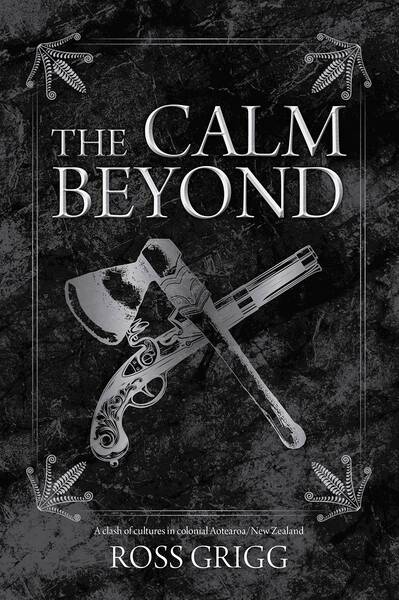
by Ross Grigg
For whatever reason, the narrative of New Zealand history has often shown prominent Maori figures of the 19th century in contrasting black and white. That is, for every Tamati Waka Nene there has been in the background a Hone Heke busily and repeatedly chopping down a flagstaff; for every Titokowaru burying himself in the mores and attitudes of the Pakeha there is a Te Kooti rampaging around great swathes of the landscape in furious and bloody rejection of both; for every Wiremu Tamihana using precise logic and Christian tenets to justify the Kingitanga, there is a Kereopa Te Rau collecting heads and allegedly eating eyes.
Ross Grigg’s work, ’The Calm Beyond’ features the same dichotomy in its central character, Te Rauparaha, long known as a fearsome and accomplished killer of men. Grigg’s analysis of the period leading up to the tragedy known first as the Wairau Massacre, though, shows that the Ngati Toa supremo was something more.
In fact, Te Rauparaha faced exactly the same problem as other Maori leaders of the times in facing up to a European hunger for land that not only fuelled determined attempts to evade the spirit of Treaty attempts to protect the ownership of land, but flouted them altogether when no other course was open. Where the Te Rauparaha of earlier years would have solved the problem in blood and mayhem, Grigg has the leader of 1843 realise, as Titokowaru would quarter of a century later, that the tide of European settlement was irresistible both in numbers and military might.
‘Uneasy lies the head that wears a crown’ wrote Shakespeare, and Te Rauparaha’s dilemma was not appreciated by those who neither understood nor shared his vision. Grigg admirably represents the leader’s ‘hawks and doves’ dilemma in the contrasting counsels of the war leader Te Rangihaeata and Te Rauparaha’s fictional son, Kahurangi, who will have to lead Ngati Toa in the ways of co-existence in the future. More, the Te Rauparaha who has no hesitation, in the book, in resorting to a mere and wholesale slaughter to avenge a passing insult, is prepared to defy both his own reputation and his council of chiefs in swallowing Company insults for the sake of acknowledging the white man’s way of doing things.
The New Zealand Company in general, and Arthur Wakefield in particular, do not emerge well from Grigg’s exposé of attitudes and motives, while the Company’s supporting cast of officials, bureaucrats and stakeholders appear in no better light. Sadly, these attitudes resonate through the Victorian period, a time that has been termed ‘The Age of European Expansion’ when land sequestration was the fate of indigenous peoples in both Americas; South Africa, Australia and the Mediterranean littoral as well as New Zealand. Grigg has unerringly hit the nail on the head in his representation of all the shady dealing, reprehensible attitudes, broken promises and expedience that went with European determination to acquire land in any way that lent itself to the end and, as noted, it is not a pretty sight.
‘The Calm Beyond’ is a scholarly representation of one of the first culture clashes in our history. Was justice done? Perhaps the last word in that ought to lie with the Governor-General, Lord Fitzroy: “The Englishmen were very greatly to blame, and as they brought on and began the fight, and as you were hurried into crime by their misconduct, I will not avenge their death. In future let us dwell peaceably without distrust. I have told you my decision, and my word is sacred.”
Author: Ross Grigg
Publisher: The Copy Press
ISBN: 978-0-473-69978-9 (Paperback)
RRP: $35
Available: Print direct from the author, [email protected];
The Copy Press https://www.copypress.co.nz/shop/; $35 + p&p if buying online
Paper Plus Ferrymead; 1005 Ferry Rd, Christchurch
E-book: https://mebooks.co.nz/; Amazon B0CQLLC8PN

 RSS Feed
RSS Feed
